
Cepora nerissa, the common gull, is a small to medium-sized butterfly of the family Pieridae, that is, the yellows and whites, which is native to Sri Lanka, India, China, southeast Asia, and Indonesia.

Iambrix salsala, the chestnut bob, is a butterfly belonging to the family Hesperiidae, that is found in parts of South Asia and Southeast Asia.

Odontoptilum angulata, the chestnut angle or banded angle, is a butterfly belonging to the family Hesperiidae and is found in India and southeast Asia.
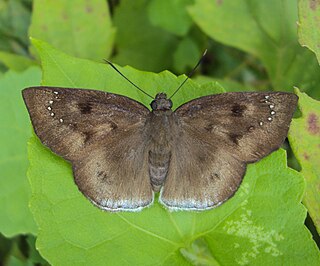
Tagiades gana, the immaculate snow flat, large snow flat or suffused snow flat, is a butterfly belonging to the family Hesperiidae found in Indomalayan realm.

Appias indra, the plain puffin, is a small butterfly of the family Pieridae, that is, the yellows and whites, which is found in south and southeast Asia.

Junonia hierta, the yellow pansy, is a species of nymphalid butterfly found in the Palaeotropics. It is usually seen in open scrub and grassland habitats.

Mycalesis subdita, the Tamil bushbrown, is a satyrine butterfly found in south India and Sri Lanka. It is not resolved whether this is a good species or is a subspecies of Mycalesis visala.

Hypolycaena erylus, the common tit, is a small but striking butterfly found in India and South-East Asia that belongs to the lycaenids or blues family. The species was first described by Jean-Baptiste Godart in 1823.

Ypthima huebneri, the common fourring, is a species of Satyrinae butterfly found in Asia.

Cirrochroa thais, also known as the Tamil yeoman, is a species of nymphalid butterfly found in forested areas of tropical Sri Lanka and India. It is the state insect of Tamil Nadu, an Indian state.
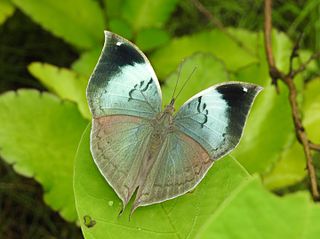
Kallima horsfieldii, the blue oakleaf, southern blue oakleaf or Sahyadri blue oakleaf, is a nymphalid butterfly found in India. The underside appears like a leaf complete with midrib while the upperside is brilliantly coloured.

Deudorix epijarbas, the cornelian or hairy line blue, is a species of lycaenid or blue butterfly found in south and southeast Asia from India to Fiji, including the Philippines, and also the tropical coast of Queensland in Australia. The species was first described by Frederic Moore in 1857.
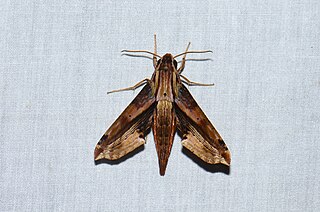
Eupanacra mydon, the common rippled hawkmoth, is a moth of the family Sphingidae.
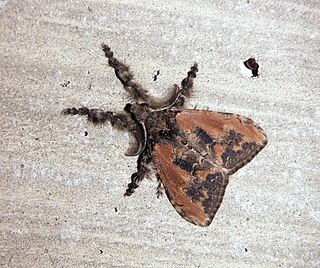
Olene mendosa, the brown tussock moth or hairy tussock moth, is a species of moth in the family Erebidae. The species was first described by Jacob Hübner in 1823. It is found in India, Bangladesh, Sri Lanka, Indonesia, Taiwan, Thailand and Australia.

Agriades jaloka, the Jaloka mountain blue, is a butterfly in the family Lycaenidae. It is found in Asia.

Zizeeria karsandra, the dark grass blue, is a small butterfly first described by Frederic Moore in 1865. It is found from the southern Mediterranean, in a broad band to India, Sri Lanka, the Andaman and Nicobar islands, Myanmar, Thailand, Malaysia, Yunnan, Indonesia, the Philippines, Arabia, United Arab Emirates, Saudi Arabia and Oman, New Guinea and northern and eastern Australia. It belongs to the lycaenids or blues family, and the tribe Polyommatini.

Sasunaga tenebrosa is a moth of the family Noctuidae first described by Frederic Moore in 1867. It is found from the Indian subregion, Sri Lanka to Sundaland, the Philippines and Sulawesi.

Acosmeryx shervillii, the dull forest hawkmoth, is a moth of the family Sphingidae. The species was first described by Jean Baptiste Boisduval in 1875. It is found from the Indian subregion, Sri Lanka, to Sundaland, the Philippines and Sulawesi. Acosmeryx pseudonaga is sometimes treated as a valid species.
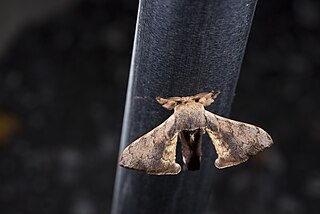
Trilocha varians, the Greenish silk-moth is a moth in the family Bombycidae described by Francis Walker in 1855. It is widespread in the Oriental region from India, Sri Lanka, China, extending to Taiwan, the Philippines, Pakistan, Sulawesi and Java.

Nyctibatrachus robinmoorei, also known as Robin Moore's night frog or the Tirunelveli wrinkled frog, is a species of frog in the family Nyctibatrachidae, commonly known as the robust frogs. It was described in 2017, along with six other species in its genus, by the herpetologist Sonali Garg and her colleagues. A small frog, it has an adult male snout–vent length of 12.2–13.4 mm (0.48–0.53 in). It is mainly reddish-brown, with a light grey underside, light orangish-brown bands running from the eyes to the middle of the back, light brown limbs, and darker brown hands and feet. When preserved in ethanol, it is mostly brown, with light greyish-white undersides and light greyish-brown limbs.






















